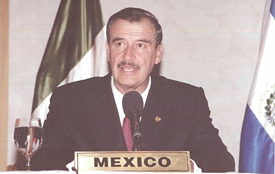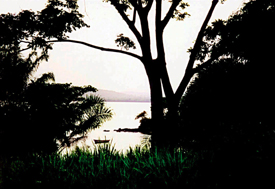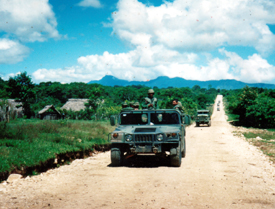 http://www.asej.org/ACERCA/plan_pueblo_panama.html
http://www.asej.org/ACERCA/plan_pueblo_panama.html http://www.asej.org/ACERCA/plan_pueblo_panama.html
http://www.asej.org/ACERCA/plan_pueblo_panama.html
When Vincente Fox, in early 2001, announced his comprehensive plan for a major transportation and industrial corridor from Puebla, Mexico all the way to Panama, it immediately drew fire from the Zapatista Army of National Liberation. Subcommandante Marcos denounced the plan saying, "the Isthmus is not for sale!"
The plan, which calls for vast displacement of native communities, rampant and uncontrolled ecological devastation, and massive industrial development will irrevocably damage this region--rich in culture, biodiversity and natural wealth.
Plan Puebla Panama, the name given by Fox to this disastrous scheme, has already seen tremendous alliances built to oppose it. Because of the PPP's critical role in providing the infrastructure necessary for the continual expansion of global trans-oceanic trade, it also provides the anti-corporate globalization and global justice movements with a uniquely possible opportunity to effectively halt the expansion of free trade.
 Subcommandante Marcos of the EZLN denounces Plan Puebla Panama saying, "The Isthmus is not for sale!"
Subcommandante Marcos of the EZLN denounces Plan Puebla Panama saying, "The Isthmus is not for sale!"
Photo: Courtesy of W. Call
Central America has always been an important resource colony for both the United States and the world, offering rich resources and cheap "expendable" labor on the narrowest strip of land separating Atlantic and Pacific. Central Ameria is also critical as the land bridge connecting North and South America. With the globalization of free trade, the aging Panama Canal can no longer sustain the increasing volume of goods from Pacific Rim factories bound for US and European markets.
This growing ship trade can be traced back to the establishment of extensive networks of sweatshops in Asia. Partially assembled products from a low paid work force in Asia need to find their way to the gluttonous Eastern U.S. and Western European markets.
Economic globalization drives the need for transportation alternatives to the clogged and obsolete Panama Canal. For over 100 years, the expansion of capitalism has led to proposals for cross-isthmus dry canal mega-projects for trans-oceanic movement of goods. These mega-projects involve the construction of massive deep-water ports on both coasts, capable of hosting the largest ocean freighters. These ports will be connected by high speed rail lines and highways. This massive transportation corridor will open the region to further exploitation of the region's forests, minerals and oil and lead to the development of extensive networks of maquiladora sweatshops (where components manufactured in Asian factories can be assembled into finished products). The dry canal megaprojects will also involve the construction of industrial shrimp farms, oil refineries, smelters and vast industrial development, leading to wide swaths of ecological and cultural devastation along the Isthmus.
At least five such dry canals are proposed along Central America's isthmus, including southern Mexico, Nicaragua, Colombia and elsewhere. In Mexico and Nicaragua the canals will obliterate some of the richest, most biodiverse rainforest lands, home to indigenous communities.
 President Fox of Mexico.
President Fox of Mexico.
Photo: Courtesy of W. Call
Although these transoceanic mega-projects have been planned for years, President Fox of Mexico has packaged these plans in a new "regional integration" proposal: the Plan Puebla Panama (PPP). The PPP will include all seven Central American countries and southern Mexico, a region encompassing 102 million square kilometers and 63 million citizens. In Mexico, this region contains the most cultural and biological diversity in the country. The PPP proposes to link the trans-oceanic megaprojects with the development of a north-south industrial and transportation infrastructure.
Funding is anticipated from the World Bank, Inter-American Development Bank and Central American Development Bank. The funds would be invested in new highways, port and airport expansion, tele-communications, and gas and oil pipelines.
Fox touts the PPP as bringing "the fruits of globalization" to Southern Mexico and Central America, advancing Bush's Free Trade Area of the Americas (FTAA-ALCA) south to the Darian peninsula of Panama. Here, Plan Colombia kicks in to complete US dominance over this critical region and to open the Free Trade "gateway" into South America.
The geographical scope of the PPP includes important petroleum assets, 34 million hectares of virgin timber, spectacular fresh water reserves, 30 million low-wage workers, and the World Bank-created "Meso-American Biological Corridor," a much-coveted gold mine of biodiversity.
In its essence, the PPP has three goals: (1) increase the transportation and industrial infrastructure in the region, improving the capacity for export industries, (2) catalyze a shift of the region's economy from agriculture to assembly plant maquiladoras and manufacturing, and (3) expand private control over the vast natural resources in the region. Land privatization is key to all of these goals and underpins the PPP.
The PPP is clear about its plan to remove rural and indigenous communities from the lands that have sustained them for thousands of years, and to place them in urban slums located adjacent to sweatshop factories.
 Rich rainforests, and all of its inhabitants, are threatened by the PPP.
Rich rainforests, and all of its inhabitants, are threatened by the PPP.
photo: ACERCA
What will happen to the land when the people are removed?
Alfonso Romo serves as a PPP advisor and directs Grupo Pulsar, one of Mexico's most important transnational corporations. Romo is a biotech seed giant and Grupo Pulsar currently has tree plantations in Chiapas (nearly 50,000 acres). More plantations are planned. These chemical-intensive, non-labor-intensive operations will irreparably damage the land without even offering significant local employment. With Romo's ties to biotechnology there is certainly a future possibility of genetically engineered tree plantations being developed throughout the Central American Isthmus. The World Rainforest Movement has reported that the development of primarily non-native tree plantations in the region is directly due to the demand for raw materials for packaging for sweatshops.
The development of roads through the North Atlantic Autonomous Region of Nicaragua and around the Lacandon Rainforest of Chiapas have led to dramatic increases in the logging of the native forests in those regions. Forests on indigenous lands and in protected reserves alike are being ravaged, legally and illegally, by national and multi-national ventures. Indigenous peoples in forested areas often act as the last line of defense of their forest homeland. With the expansion of road construction throughout the Isthmus and the removal of indigenous peoples from the remaining forested lands, the forests will be opened wide for unchecked clearcutting and high grading.
This transformation of the land from forest to clearing has other impacts on the people and ecosystems. When Hurricane Mitch struck Central America in October of 1998, the most devastation occurred as a result of the massive mudslides and floods that ensued. The areas that suffered the most devastation and the highest losses of life were those areas that had been ecologically damaged and deforested years before. Where the rainforests still stood, the damage was minor, because the soils were able to retain the heavy rains, but where the land was bare, the rain had nowhere to go except into huge river floods, and without tree roots to hold the soil in place, the saturated earth slid off of the hillsides over the communities below.
 Miltary convoy driving through Indigenous Villages.
Miltary convoy driving through Indigenous Villages.
Photo: ACERCA
The United States military has a long and disastrous history throughout Latin America. Currently, US military presence is strongest in El Salvador, Honduras, and Nicaragua. After Hurricane Mitch, many American troops that were sent to the region for relief efforts never left. It has been reported that 12,000 U.S. troops will be deployed in a joint operation in Guatemala. The PPP both opens a corridor and provides a new excuse for militarization by the U.S. all the way from Mexico to Colombia. US factories, refineries and smelters in such an "unstable" region will require the heavy and on-going presence of the American military.
Indigenous activists in the region report an increase in military operations in Central America since September 11. George Bush's "War on Terrorism" is being used as an excuse in the region to crack down on activism.
The on-going US Navy bombing of Puerto Rico's island of Vieques and the presence of the Southern Command of the U.S. military in Puerto Rico, is also key in the overall military dominance of the region.
The PPP is potentially the greatest threat to indigenous communities and culture since the landing of Columbus as neoliberal economics is pitted against indigenous thought and wisdom.
As described above, one of the main goals of the PPP is the privatization of land and displacement of indigenous communities from their homelands. Indigenous culture and language is intimately tied to the land. Indigenous communities and culture in the region are already under assault by the increasingly dominant American capitalist consumer culture, and the loss of their land base will almost certainly sound the death knell for the remaining traditions that the indigenous communities still retain.
Uruguayan-born writer Carlos Fazio states that geo-politics are key to the PPP. To Fazio, the Plan represents a counter-insurgency strategy directed at the rebel, largely Mayan, Zapatista Army of National Liberation (EZLN) and other armed groups in southern Mexico and Central America. The Zapatistas' goals of indigenous autonomy and the collective use of land and natural resources are "antithetical" to the PPP. In La Jornada, Fazio stated, "The father of this plan lives in Washington..." describing Fox's neoliberal affinity and the U.S. strategic, economic, and energy ambitions in the region.
This massive remaking of the region is key for the continued expansion of globalization. Without this new transportation infrastructure, global trade cannot continue to expand. The Central American region remains a linchpin for the expansion of global trade. However, because of this critical importance to economic globalization, it is also its Achilles Heel.
If these mega-project developments can be stopped, a serious problem arises for the multinational corporations who need to ship capital goods from ocean to ocean, from South America to North America or who dream of cheap assembly plants throughout the region.
The forces against corporate economic globalization are on the rise. Opposition to the PPP has already started in southeastern Mexico and Central America. This spring, some members of civil society organized their own consultation: a meeting about the PPP in Tapachula, a city on the Chiapas-Guatemala border. Present were over one hundred organizations, including groups from most of the southern Mexican states, as well as Guatemala, Nicaragua and El Salvador. The group met for nearly three days and emerged with a common strategic response to the PPP. At the end of the meeting, the group issued a statement reading, in part:
"Given that any development plan must be the result of a democratic process, and not an authoritarian one, we firmly reject the Puebla-Panama Plan.... We condemn all strategies geared toward the destruction of the national, peasant and popular economy, [and] food and labor self-sufficiency."
Opposition is also mounting in the U.S. In Washington, DC, on October 1, 2001 approximately fifty people representing 21 organizations gathered to discuss Plan Puebla Panama (PPP). The meeting was called for by ACERCA with Mexico Solidarity Network, Global Exchange and CISPES to build the foundation for a broad US-based movement against the PPP in solidarity with the global south.
The meeting brought together many U.S. based NGOs and representatives from Mexico, Honduras, Panama and Colombia. The afternoon meeting resulted in an informal coalition that will work to support the inhabitants of the region that will be affected by the PPP.
We, in the anti-corporate globalization movement have the opportunity to join with our southern allies in exploiting this Achilles Heel. It is also our responsibility to listen to and support development plans that come from the people of the affected region while dealing a major blow to corporate economic globalization. As one of our southern allies said, "it is time to build corridors of resistance to the PPP."
This briefing paper was prepared by ACERCA with PPP information provided by Wendy Call, John Ross, and Mexico Solidarity Network
ACERCA
(Action for Community & Ecology in the Regions of Central America)
(Acción para La Comunidad y La Ecología en Las Regiones de Centroamericana)
Email: acerca sover.net
sover.net
Central America Campaign: colombia acerca.org
acerca.org
For more Information:  http://chiapas.indymedia.org/
http://chiapas.indymedia.org/
Action for Community & Ecology in the Regions of Central America
POB 57 Burlington, VT 05402 USA
Phone:(802)863-0571 Fax:(802) 864-8203
Email: acerca sover.net
sover.net
Updated Monday, March 04, 2002 08:50 PM.
Plan Puebla Panama | ALCA/FTAA | www.agp.org | www.all4all.org